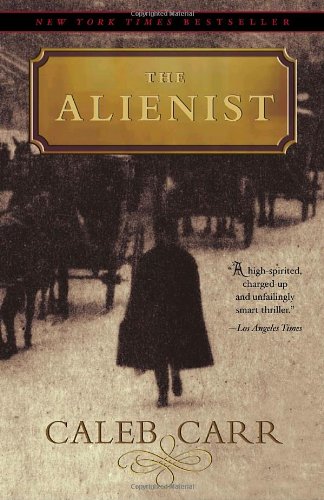A period serial killer piece from the writer of Drive and the director of True Detective? Sign me up!
Genre: TV Pilot – Serial Killer
Premise: When a boy prostitute is brutally murdered in 1896 New York City, an “alienist” – a special type of doctor who studies mental pathology – attempts to find the killer.
About: The pilot for today’s show comes from powerhouse artists Houssein Amini (Drive), Cary Fukunaga (True Detective), and Eric Roth (Benjamin Button). It will star Daniel Bruhl (Inglorious Basterds), Luke Evans (The Hobbit), and Dakota Fanning. The show is based on the novel by Caleb Carr. The show will surprisingly air on TNT, which realizes that if it wants attention, it needs to get into the premium television business.
Writer: Houssein Amini (adapted from the novel by Caleb Carr)
Details: 66 pages
We’re in an interesting time with television. It reminds me of the reality TV craze that hit in the early 2000s where anybody who ended their pitch with “and it’s a reality TV show,” would get their show on the air.
But then, after 10,000 terrible reality TV shows hit the air, the ratings dried up, and no one was sure what to do anymore. Eventually much cheaper productions moved to ancillary channels. But for awhile there it was touch and go on what would happen with the format.
Right now there are SO MANY FREAKING SHOWS spread across SO MANY CHANNELS that casualties are a foregone conclusion. There just aren’t enough eyeballs to watch everything. And even when there are, you have to first find the shows, then find out where they’re on, then find out when they’re on. And how do you do that when all the high profile shows are saying, “Look over here instead!!”
You have guys like Matthew Weiner making some bonkers mega-budgeted show on Amazon. You’ve got the Tom Hardy show, Taboo, which is good, but the average viewer has no idea what it’s about. You’ve got this misconceived Ryan Murphy’s show, “Feud,” which is a 90 minute movie at best being stretched into a season of television. You’ve got award winning shows like Atlanta, yet I haven’t met a single person who’s actually seen it.
The Alienist fits into that mold. You have really smart creative people making this show. But it’s so dark and so intense, that to stand out amongst this endless list of competition is going to be darn near impossible unless the show is great.
So, is the show great?
Well, I know one way to find out.
Local newspaper reporter John Moore has been sent to check out a gruesome murder at the unfinished Williamsburg Bridge. “Unfinished” because this is 1896 New York. I’ll tell you who is finished though. The prostitute boy who’s been sliced open and had his eyes gouged out.
Moore, horrified by this sight, is only able to recover once his friend, Lazlo Kreizler, enters the fray. Kreizler is a new breed of psychologist called an “alienist,” whose main job it is to decide whether criminals are sane enough to be punished for their crimes. But Kreizler’s talents will have to be used for something far greater – catching a killer.
The two are indirectly helped by Theodore Roosevelt. That would be POLICE COMMISSIONER Theodore Roosevelt, in the job he held before racing up the political ladder. Roosevelt is a bit of a forward thinker, even hiring a young woman, Sara Howard, to work at the precinct – something that was unheard of back in the day.
Roosevelt realizes that this killer is way beyond anything the police force has dealt with in the past. But he also knows that if he allows an alienist on the case, he’ll be seen as a fool. So he assigns Kreizler and Moore to find the killer on the down low.
While Moore is more of an observer, Kreizler is the kind of bizarre soul who keeps jars of fetuses in his office. Of course, they’re going to need that bizarreness to take down the single most perplexing serial killer New York has ever seen.
A question I’m often asked is: What are differences between an amateur writer and a pro writer? Writers feel that if they can work off a defined set of rules, they can mirror what the pros do.
Unfortunately, it’s not that simple. As an amateur writer, you don’t know what you don’t know what you don’t know. I can tell you that the plot choice you made on page 54 doesn’t fit, tonally, with the rest of the script. Or that the supporting character you like so much is redundant. Or that the majority of your scenes don’t push the plot forward. But you don’t see that. To you, all of those things make total sense. And they’ll continue to make sense until all the mysteries of screenwriting open up to you, something that only happens by writing script after script after script, by reading script after script after script.
When you read a pilot like The Alienist, you are seeing a professional writer who knows this medium inside and out. The attention to detail here is as impeccable as Mozart concerto. The research of this period is as good as an historian’s. And the writing itself has a sophisticated edge to it. For example, we get this line: “The murdered boy kneels in supplication, the falling snow settling on his long hair and blood soaked dress,” instead of this one “The dead boy lays there, mangled and bloody.”
I also find that pros tweak a familiar situation so that it’s not quite like what we’ve seen before. For example, a common scene I run into is the john hiring the prostitute, and then, to show that our john is “likable,” he stops the prostitute from trying to have sex with him and, instead, “just wants to talk.” Fucking kill me if I ever read that scene again.
But anyway!
We meet John Moore with a prostitute and, as he’s having sex with her, he’s angry because she’s telling him that she’s in love with another man. At that moment, the madame bursts in and the girl “drops the act.” It was all a little game they were playing.
It was a small thing but the point is, I’ve read a lot of prostitute scenes, and the fact that the writer gave me one that I hadn’t seen before is what separates him from the standard amateur.
But the place where professionals really separate themselves is in the characters. They create characters who are complex and different. I’ll give you guys a little tip here to help you get closer to these million-dollar-a-project screenwriting studs – create characters with CONTRAST.
So here you have Lazlo Kreizler, who is into some really dark disturbing shit. As I mentioned before, he keeps fetuses in his office. And yet he’s always happy, always having fun. That contrast between the light and the dark is what makes the character interesting to watch. If Kreizler was into dark shit and he was also really depressed, his character would seem on the nose, or worse, boring.
That’s not to say you can’t create characters who are of one mind. You could argue that Rust Cohle from True Detective was into dark shit and also acted dark. What I’m saying is, contrast is an easy hack you can use to make a character pop.
And, actually, that’s my only complaint with The Alienist, is that the character of John Moore doesn’t have enough going on. Not as much time was put into him as was Kreizler. To be honest, I don’t even know why he’s in the story. Why would the police force, or even Kreizler, want a journalist hanging around? Isn’t that the opposite of what you want? Someone who might blab about your investigation to the local paper?
It would’ve been more interesting to pair Kreizler with the lone woman at the precinct, Sara Howard. At the time, women were barely allowed inside a police department, nor were they allowed to be exposed to gruesome murders. Imagine the conflict involved with her co-heading up this investigation with weirdo Kreizler.
Whatever the case, The Alienist should pull in people who liked that first season of True Detective. It’s just as dark, if not darker, than that beloved show.
[ ] What the hell did I just read?
[ ] wasn’t for me
[xx] worth the read
[ ] impressive
[ ] genius
What I learned: You change the eyes, you change the view. One of the best ways to breathe new life into familiar situations is to change the eyes through which we’re experiencing those situations. If you give us a murder investigation through the eyes of a cop, you’re giving us the same thing we’ve always seen. But if you give us a murder investigation through the eyes of an alienist, now the exact same situations feel different. That’s because an alienist has a different set of objectives. They have a different set of criteria for why they do what they do. So the next time you come up with an idea, ask yourself how that idea changes depending on whose eyes you explore it through. You may find that a character you didn’t think twice about actually has the most compelling POV on the matter.



